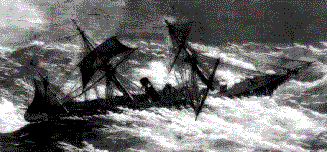
Gerald Keegan's Summer of Sorrow, 1847 (Published 1895)
Part 3
I went to the cooking booth and found a Frenchman in charge. Bribing him with
a shilling he gave me a loaf and a tin of hot tea. Aileen could not eat a bite,
though she tried to do to please me, but drank the tea. The rain continued and
the east wind penetrated between the boards of the wretched sheiling. What a
night it was! I put my coat over Aileen, I pressed her to my bosom to impart
some heat to her chilled frame, I endeavored to cheer her with prospects of the
morrow. Alas, when morning came she was unable to move, and fever and chill
alternated. I sought the doctor, he was not to be had. Other emigrant ships had
arrived, and he was visiting them. Beyond giving her water to assuage her thirst
when in the fever it was not in my power to do anything. It was evening when the
doctor, yielding to my importunities, came to see her. He did not stay a minute
and writing a few lines told me to go to the hospital steward, who would give me
some medicine. Why recall the dreadful nights and days that followed? What
profit to tell of the pain in the breast, the raging fever, the delirium, the
agonizing gasping for breath -- the end? The fourth day, with bursting heart and
throbbing head, I knelt by the corpse of my Aileen. There was not a soul to
help; everybody was too full of their troubles to be able to heed me. The island
was now filled with sick emigrants, and death was on every side. I dug her
grave, the priest came, I laid her there, I filled it in, I staggered to the
shed that had sheltered us, I fell from sheer exhaustion, and remember no more.
When I woke, I heard the patter of rain, and felt so inexpressibly weary I could
think of nothing, much less make any exertion. My eye fell on Aileen's shawl,
and the past rushed on me. Oh, the agony of that hour; my remorse, my sorrow, my
beseeching of the Unseen. Such a paroxysm could not last long, and when
exhausted nature compelled me to lie down, I turned my face to the wall with the
earnest prayer I might never awaken on this earth.

(Written by Father Tom O'Hare.)
I lifted him in my arms and carried him out of the shed. I was powerful
strong when I was young, and tho' he was tall and broad-shouldered he was wasted
to skin and bone. I laid him down in the shade of a tree, for the sun was hot.
He didn't look at the river or the hills beyond, but fixed his eyes on a spot
that I took to be a burying place. 'Go back,' he whispered, ' and bring the bag
below my berth.' I went, and found a woman had already been put in the poor bed
I had lifted him out of. I reached for the bag and took it to him. Pointing to a
spot in the burying-place he told me to go there and I would see a grave with a
cross at its head and the name Aileen cut on it. 'You can read?' 'Yes' says I. I
did his bidding and coming back told him I had found the grave. 'Promise me,
you'll bury me beside that grave.' I promised him. 'Open that bag and you'll
find in it a little book.' I reach it to him. 'Take it,' says he, 'there are
pages in it I would tear out were I able. Let it go. Save the book; it will tell
to those now unborn what Irish men and women have suffered in this summer of
sorrow.'

In addition to the diary excerpts, the 1991 edition of Keegan's story
contains two newspaper accounts of the quarantine station where many emigrants
disembarked.
The Montreal Gazette, September 5, 1847:
In the hastily erected emergency sheds the people were dying by the score in
the crowded sheds, in the stench and the heat, desperately neglected. When there
were enough attendants they were hastily tossed into shallow pits nearby when
they succumbed to the fever. In all the history of Montreal there is no story so
poignant. There were hundreds of orphaned children. Many of the little ones had
to pulled from the arms of a parent who had suddenly died. Older ones were
wandering around frantically looking for parents who were already buried in the
pits. The scene in the children's shed was beyond description.
From the Montreal Immigrant Society Bulletin in 1848:
From Grosse Isle, the great charnel house of victimized humanity, up to Port
Sarnia and all along the St. Lawrence and the Great Lakes, wherever the tide of
immigration extended, are to be found the final resting places of the sons and
daughters of Erin -- one unbroken chain of graves where rest fathers and
mothers, sisters and brothers, without a stone to mark the spot. I do not know
that the history of our times has a parallel for this Irish exodus. . . . It was
the forced expulsion and panic rush of a stricken people and it was attended by
frightful scenes of suffering and death.
END OF KEEGAN DIARY

Taylor, S. (Unknown). Views
of the famine: Vassar College web site. Retrieved December 1, 2001 from
World Wide Web: http://vassun.vassar.edu/~sttaylor/FAMINE